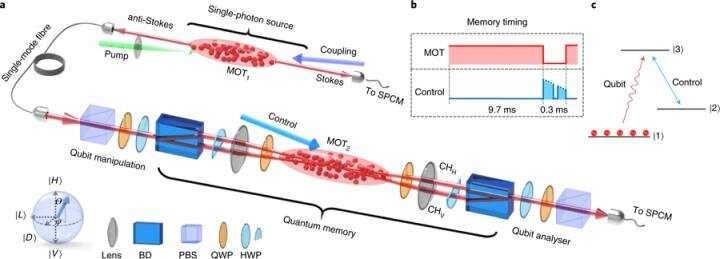Physicists set a new record of quantum memory efficiency

Like memory in conventional computers, quantum memory components are essential for quantum computers—a new generation of data processors that exploit quantum mechanics and can overcome the limitations of classical computers. With their potent computational power, quantum computers may push the boundaries of fundamental science to create new drugs, explain cosmological mysteries, or enhance accuracy of forecasts and optimization plans. Quantum computers are expected to be much faster and more powerful than their traditional counterparts as information is calculated in qubits, which, unlike the bits used in classical computers, can represent both zero and one in a simultaneous superstate.
Photonic quantum memory allows for the storage and retrieval of flying single-photon quantum states. However, production of such highly efficient quantum memory remains a major challenge as it requires a perfectly matched photon-matter quantum interface. Meanwhile, the energy of a single photon is too weak and can be easily lost into the noisy sea of stray light background. For a long time, these problems suppressed quantum memory efficiencies to below 50 percent—a threshold value crucial for practical applications.
Now, for the first time, a joint research team led by Prof. Du Shengwang from HKUST, Prof. Zhang Shanchao from SCNU, Prof. Yan Hui from SCNU and Prof. Zhu Shi-Liang from SCNU and Nanjing University has found a way to boost the efficiency of photonic quantum memory to over 85 percent with a fidelity of over 99 percent.
The team created such a quantum memory by trapping billions of rubidium atoms into a tiny, hair-like space—those atoms are cooled down to nearly absolute zero (about 0.00001 K) using lasers and a magnetic field. The team also found a smart way to distinguish a single photon from the noisy background light. The finding brings the dream of a universal quantum computer a step closer to reality. Such quantum memory devices can also be deployed as repeaters in a quantum network, laying the foundation for a new generation of quantum-based internet.
"In this work, we code a flying qubit onto the polarization of a single photon and store it into the laser-cooled atoms," said Prof Du. "Although the quantum memory demonstrated in this work is only for one qubit operation, it opens the possibility for emerging quantum technology and engineering in the future."
The finding was recently published as a cover story of the authoritative journal Nature Photonics, the latest of a series of research from Prof Du's lab on quantum memory, first begun in 2011.
More information: Yunfei Wang et al, Efficient quantum memory for single-photon polarization qubits, Nature Photonics (2019). DOI: 10.1038/s41566-019-0368-8
Journal information: Nature Photonics
Provided by Hong Kong University of Science and Technology



















